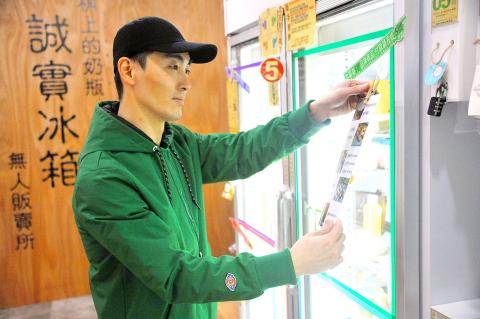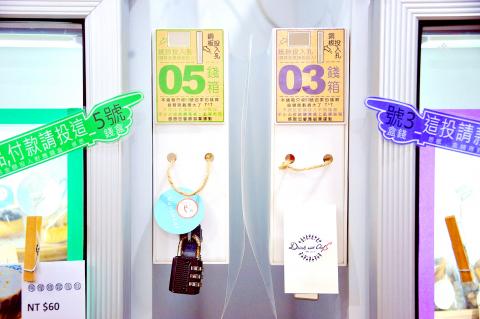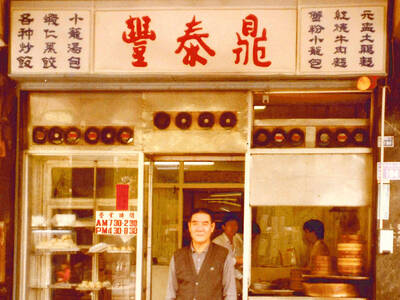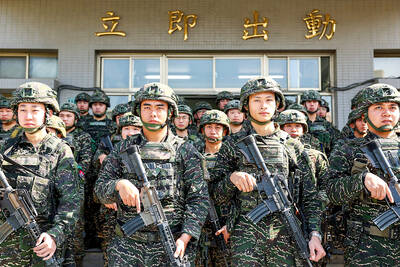King Chang (張欽) thought he had seen it all when someone drove up to his “honesty store” in a car, loaded up on goods, left a few coins and took off. But when a thief broke into one of the cash boxes, he was so overwhelmed that he closed the shop for a few weeks.
Opening in September last year in Taipei’s Xinyi District (信義區), Tree Top Milk Honesty Fridge (樹梢上的奶瓶之誠實冰箱) has no staff watching the store. Customers simply take items they want and deposit money into a corresponding cash box.
So far, Chang says the majority of customers have followed the rules — but the few “Pinocchios,” as he calls them, have caused him to remain in debt.

Photo: Han Cheung, Taipei Times
Despite his losses, Chang reopened the store last month and is intent on continuing his “honesty movement,” which he hopes will inject some positivity into society.
“People tell me that Taiwan is not ready for this kind of store yet,” he says. “I ask them, ‘At what point will we be ready?’ If we don’t start right now, we will never be ready.”
SELLING HONESTY

Photo: Han Cheung, Taipei Times
Chang says that aside from promoting honesty, he also wanted to provide small vendors with a physical space so they wouldn’t have to sell their merchandise in the street or online.
“It’s like having a street fair in the store,” he says.
The store contains two fridges, which are divided into eight sections for different vendors, who use the space for free but donate a portion of their profits to Chang. There are also two shelves that contain various handicrafts. All items are either locally handmade or for charity, and the vendors can also set up a pop-up shop to personally hawk their wares.
Chang rotates the vendors every two weeks to keep things fresh, but notes that it is hard to convince people to join because of the risk involved.
Tien Chung (田中), who sells homemade soy milk, says that he does most of his business online, and losing a few bottles at the honesty store will not affect his profits much.
“I came fully aware of the risks,” he says. “I like the concept of the store. Also, my products will get more exposure.”
Selina Lin (林莎莉), who sells French pastries and other delicacies, sees it as a “test of humanity.”
“Taipei is an advanced city, and people should have some public morality,” she says. “If we are afraid of [our products being stolen], we would not be here.”
DEALING WITH PINOCCHIOS
Cheng Tzu-leong (鄭自隆), advertising professor at National Chengchi University (政治大學) says that honesty stores can be seen as a measuring stick to a society’s progress. He points out that one could sell expensive merchandise in one city without problems, while in another, people will make off with the cheapest items.
For Taiwan, Cheng believes that honesty stores will only be profitable if the prices are no higher than NT$20.
“People here probably wouldn’t sacrifice their morals to steal something that cheap,” he says. “But try putting something that’s NT$200. I’m sure many won’t be able to resist.”
After several months of selling products that are way higher than NT$20, Chang has mixed feelings. On one hand, the number of honest people is much higher than he had expected. On the other hand, he found that even just a small number of Pinocchios can seriously affect business.
“They say good always triumphs over evil, but that does not seem to be the case here,” he says.
Chang says the Pinocchios are mostly regular people between 20 and 40 years old. Most have been reported to him by other customers.
He is still thinking of how to deal with the thieves. He’s confronted some of them, but doesn’t want to call the police just yet. He will start posting warning signs in the store, and perhaps add photos of repeat offenders.
“I opened this store to make society more harmonious,” he says. “There’s so much antagonism these days, and I don’t want to add to it. Instead, I hope that they do some soul searching after being warned and repent.”
Chang understands that there’s no way to completely eradicate the dishonest customers. But looking ahead, he also thinks the store is a good educational opportunity for the next generation.
“I’ve seen parents bring their kids in, tell them what honesty means and hoist them up so they can insert the coins into the box,” he says.
He’s also received a message from another store who decided to follow his model after reading a news report.
“I was very happy to hear that because if there are more stores like this in Taipei, our moral character will slowly but surely improve.”

March 24 to March 30 When Yang Bing-yi (楊秉彝) needed a name for his new cooking oil shop in 1958, he first thought of honoring his previous employer, Heng Tai Fung (恆泰豐). The owner, Wang Yi-fu (王伊夫), had taken care of him over the previous 10 years, shortly after the native of Shanxi Province arrived in Taiwan in 1948 as a penniless 21 year old. His oil supplier was called Din Mei (鼎美), so he simply combined the names. Over the next decade, Yang and his wife Lai Pen-mei (賴盆妹) built up a booming business delivering oil to shops and

The Taipei Times last week reported that the Control Yuan said it had been “left with no choice” but to ask the Constitutional Court to rule on the constitutionality of the central government budget, which left it without a budget. Lost in the outrage over the cuts to defense and to the Constitutional Court were the cuts to the Control Yuan, whose operating budget was slashed by 96 percent. It is unable even to pay its utility bills, and in the press conference it convened on the issue, said that its department directors were paying out of pocket for gasoline

On March 13 President William Lai (賴清德) gave a national security speech noting the 20th year since the passing of China’s Anti-Secession Law (反分裂國家法) in March 2005 that laid the legal groundwork for an invasion of Taiwan. That law, and other subsequent ones, are merely political theater created by the Chinese Communist Party (CCP) to have something to point to so they can claim “we have to do it, it is the law.” The president’s speech was somber and said: “By its actions, China already satisfies the definition of a ‘foreign hostile force’ as provided in the Anti-Infiltration Act, which unlike

President William Lai’s (賴清德) March 13 national security speech marked a turning point. He signaled that the government was finally getting serious about a whole-of-society approach to defending the nation. The presidential office summarized his speech succinctly: “President Lai introduced 17 major strategies to respond to five major national security and united front threats Taiwan now faces: China’s threat to national sovereignty, its threats from infiltration and espionage activities targeting Taiwan’s military, its threats aimed at obscuring the national identity of the people of Taiwan, its threats from united front infiltration into Taiwanese society through cross-strait exchanges, and its threats from